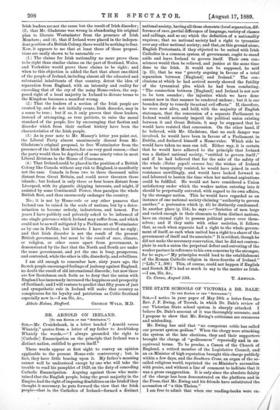DR. ARNOLD ON IRELAND.
[To THE EDITOR OF THE " SPECTATOR."] SIR,-Mr. Cruickshank, in a letter headed " Arnold versus Whately," quotes from a letter of my father to Archbishop Whately the words,—" I always grounded the right to [Catholic] Emancipation on the principle that Ireland was a distinct nation, entitled to govern itself."
These words appear at first sight to convey an opinion applicable to the present Home-rule controversy ; but, in fact, they have little bearing upon it. My father's meaning cannot well be understood except by one who will take the trouble to read his pamphlet of 1829, on the duty of conceding Catholic Emancipation. Arguing against those who main- tained that the English people, being the great majority in the Empire, had the right of imposing disabilities on the Irish if they thought it necessary, he puts forward the view that the Irish people—that is, the Catholics of Ireland—formed a distinct national society, having all those elements (local separation, dif- ference of race, partial difference of language, variety of classes and callings, and so on) which the definition of a nationality requires ; that no national society had a right to tyrannise over any other national society; and that,.on this ground alone,. English Protestants, if they objected to be united with Irish Catholics in a common system of government, ought to stand' aside and leave Ireland to govern itself. Their own con- sciences would then be relieved, and justice at the same time done to the Irish. It would not be supposed, he said (p. 25), that he was " gravely arguing in favour of a total' separation between [England] and Ireland." The con- clusions at which he had arrived merely showed the futility of the tyrannical plea which he had been combating- " The connection between [England] and Ireland is not now to be torn asunder; the injustice which we have done cannot now in that manner be rendered undone ; but it is our- bounden duty to remedy its actual evil effects." If, therefore, he were now alive, and held, with the majority of English statesmen, that the concession of a separate Parliament to Ireland would seriously imperil the political union existing- between it and Great Britain, it may be supposed that he- would have resisted that concession. On the other hand, if- he believed, with Mr. Gladstone, that no such danger was involved, he would have been in favour of a Parliament in Dublin, and declared himself a Home-ruler. Which side he- would have taken no man can tell. Either way, it is certain. that he would have adhered to the principle that Ireland, was a distinct national society, "entitled to govern itself;"' and if he had believed that for the sake of the safety of the whole (Sales populi summa lex) the wishes of Ireland. must be temporarily resisted, he would have joined in such- resistance unwillingly, and would have looked forward to. and laboured to hasten the time when her national aspirations could be fulfilled. He would not have considered a Union satisfactory under which the weaker nation entering into it should be perpetually outvoted, with regard to its own affairs, by the stronger nation. This he would have regarded as an instance of one national society claiming " authority to govern another," a pretension which (p. 43) he distinctly condemned.- In another place (p. 114), he says :—" Societies of men large and varied enough in their elements to form distinct nations, have an eternal right to possess political power over them- selves ; and if they unite with other societies, it follows that, as each when separate had a right to the whole govern. ment of itself, so each when united has a right to a share of the government of itself and its associate." It is evident, though he did not make the necessary reservation, that he did not contem. plate in such a union the perpetual defeat and outvoting of the weaker partner in reference to his own concerns by the stronger, for he says,—" My principles would lead to the establishment of the Roman Catholic religion in three-fourths of• Ireland." ("Life," I., 309.) This, of course, could not happen if English and Scotch M.P.'s had as much to say to the matter as Irish- -I am, Sir, &c.,


































 Previous page
Previous page